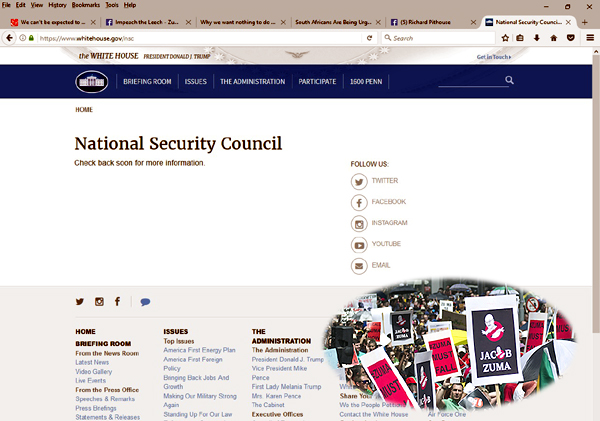 Study carefully the picture above. (The inset is mine of South African protests, today.) That’s the website page that millions, maybe billions of people worldwide access to understand U.S. foreign policy. And that’s how it looked this morning: Come Back Later.
Study carefully the picture above. (The inset is mine of South African protests, today.) That’s the website page that millions, maybe billions of people worldwide access to understand U.S. foreign policy. And that’s how it looked this morning: Come Back Later.
As a group of activists in my small town discussed the possibility of creating a new political force, I found particular use in the image above.
The inset is of the growing unrest in South Africa as the country labors to get rid of its buffoon president, Jacob Zuma.
Just in the last week the possibility of actually getting rid of Zuma increased substantially. I reported yesterday that his previously very loyal Deputy President joined the bandwagon. Many groups including the normally very pro-government labor unions are demanding he go.
Everything comes to head tomorrow, and this was really fast. The call for a nationwide strike tomorrow … was only made yesterday.
Zuma has been a manifest failure as a buffoon president. My multitude of blogs over the last seven years can be used as a simple reference and timeline. But here’s the thing:
There are a crazy number of similarities between Zuma and Trump.
Both leaders assumed power as disrupters. The qualifications that they lacked, the ribaldry if vulgarity that they seemed to be proud of, and most all the impulsiveness that validated their vow to break all rules and destroy the elite makes them blood brothers.
There are probably more dissimilarities. But their power base came from the angry and disenfranchised who truly have suffered a bum deal. In Zuma’s case it was the throngs of patriotic anti-apartheid masses who expected a much, much better situation once apartheid ended than what they ended up receiving.
In Trump’s case it was a wave of the suddenly powerful discontented, not the analytic time proved discontented of South Africa’s 20 years of no apartheid. But in both cases it was populism exploding.
(It’s also arguable, of course, that Trump and Zuma are no different from Le Pen or Duterte, and that they were just coincidentally positioned to assume the mantle of the downtrodden.)
The point is that South Africa is further along in this dynamic than we are, much further. So we can learn from them.
First, Zuma had a staying power no one expected. Second, his technical political foundation – the ANC party – has stuck with him through thick and thin. Even now as the rest of society calls for him to stand down, the ANC stands with him.
So…
…Trump could be here a lot longer than we imagine. Second, the Republican Party will likely support him to the end. Otherwise, they die, too.
So at this critical junction in South African history, what are they doing wrong? Why might Zuma not be ousted after all and a new South African history begun?
There must be hundreds of reasons, but here’s one very important one:
The political trauma that has confounded South African society for so long has so divided its society that getting rid of Zuma carries the possibility of creating something worse.
A principle opposition to Zuma has been the slowly rising Democratic Alliance. The party now controls a number of cities including Cape Town. They are well positioned to pick up the pieces of a destroyed Zuma and ANC.
But … they’ve been hijacked by racists.
The otherwise left-leaning national newspaper, the Mail & Guardian, ran an editorial today calling them out:
“The marches and protests [called for tomorrow] are almost exclusively Democratic Alliance events. While the DA boasts a pledge against racism, the party has a track record of attracting racists.”
My South African if not universal guru on future paradise, Richard Pithouse, was quoted in that editorial as writing, “[I]f it’s gonna be “civil society” – an acutely raced and classed project, and one that bends, relentlessly, towards constituted power – it’ll be another farce.”
Pithouse is right, of course. And I circle back to our own situation, and our own little group of friends dissecting Indivisible, and the Democratic Socialists, and all the other Bernie derived movements. What should we do?
Following the example taken from what South Africa didn’t do right, we shouldn’t divide ourselves further. We should open our arms to everybody, however different they may at first seem. Otherwise we collapse onto ourselves, and there will be – as in South Africa – a multitude of selves with irreconcilable differences, incapable of coalescing into successful opposition.
We hesitate – understandingly – to call for “bridging differences” or “finding common ground,” because those cliches haven’t worked and are now toxic buzz phrases. But note that that philosophy was never tried in South Africa, so perhaps we should pinch our noses and use the phrases, again.
Openness and inclusiveness. That’s the only way any new movement will succeed.